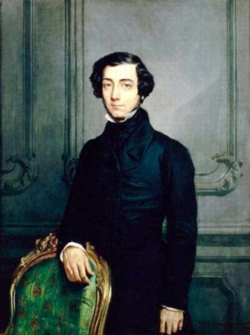Liberty Matters
What Kind of Liberal?
 It’s hard to disagree with Dan Mahoney and Aurelian Craiutu. There is no doubt that Tocqueville spoke of the imperative of self-government as a sort of universal civilization and that his work is indeed an inspiration for every friend of liberty. But what kind of liberal was he? If we confine ourselves to labels, it’s hard to say what kind of liberal he truly was. After all, he seemed to have been indifferent or agnostic about the subjugation of people by the French in North Africa and elsewhere. The same applies mutatis mutandis to John Stuart Mill and India.
It’s hard to disagree with Dan Mahoney and Aurelian Craiutu. There is no doubt that Tocqueville spoke of the imperative of self-government as a sort of universal civilization and that his work is indeed an inspiration for every friend of liberty. But what kind of liberal was he? If we confine ourselves to labels, it’s hard to say what kind of liberal he truly was. After all, he seemed to have been indifferent or agnostic about the subjugation of people by the French in North Africa and elsewhere. The same applies mutatis mutandis to John Stuart Mill and India.If we read Tocqueville for gems of wisdom here and there, as was my first experience in reading him, then there is not much else to add. I think Tocqueville may be better appreciated if we view his attempt to understand democracy in America as part of a longer tradition of thought. Vincent Ostrom used to start with the Federalist and then move to Tocqueville in the first volume of Democracy in America for an appreciation of how the system of government created by Americans drew on the creative capacity of people to give themselves institutions for self-rule extending from the local level to the nation as a whole. The second volume draws attention to the vulnerability of self-governing systems.
But this reading of Tocqueville applies to North America and cannot be extended to South America. I once gave a lecture on self-government and federalism at a Mexican university and was sharply reminded of the history of United States vis-à-vis Mexico and how mistaken or biased was Tocqueville.
So what’s left of Tocqueville? I will try to answer this question in my next posting.
Copyright and Fair Use Statement
“Liberty Matters” is the copyright of Liberty Fund, Inc. This material is put on line to further the educational goals of Liberty Fund, Inc. These essays and responses may be quoted and otherwise used under “fair use” provisions for educational and academic purposes. To reprint these essays in course booklets requires the prior permission of Liberty Fund, Inc. Please contact oll@libertyfund.org if you have any questions.